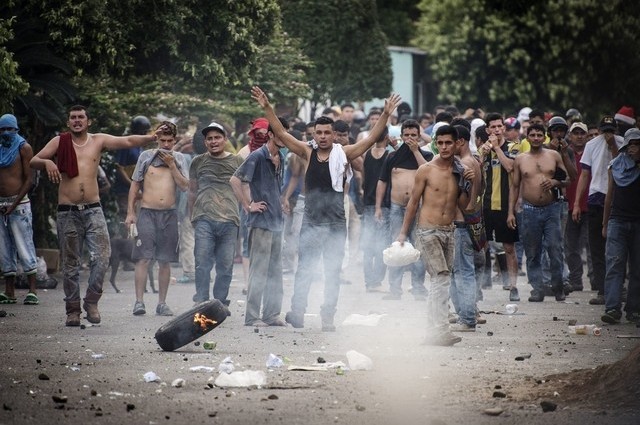Venezuela delays removing currency bills amid protests

Caracas // With protests rocking his unpopular government, embattled president Nicolas Maduro has delayed until January 2 taking Venezuela’s highest denomination bill out of circulation.
Mr Maduro said the 100-bolivar bills would temporarily remain legal tender, but the borders with Colombia and Brazil would remain closed to counter what he claims are "mafias" hoarding Venezuelan cash abroad in a US-backed plot to destabilise the country.
"You can calmly continue to use the 100 bill for your purchases and your activities," Mr Maduro said at a meeting with officials broadcast on state television on Saturday.
The bill is worth about 15 US cents (Dh0.55) at the highest official rate, and until recently accounted for 77 per cent of the cash in circulation in Venezuela.
Venezuela has the world’s highest inflation rate, set to hit 475 per cent this year, according to the IMF.
The government is trying to introduce new bills in denominations up to 200 times higher than the old ones, but the plan derailed when Mr Maduro banned the 100-bolivar note before the new bills arrived.
He said four aircraft bring the new currency from abroad were delayed by international sabotage but did not say where the money was coming from, or what type of sabotage.
Venezuelans stood in long lines at banks all week to meet a Friday deadline to exchange their currency. When the deadline extension was announced people queued up again on Saturday.
"I don’t agree with this, I’ve had to come all the way here with my miserable amount of cash to the BCV [Venezuelan Central Bank] in order to get money to eat. This is madness, I’m tired of it," said Bismary Rivero, a 39 year-old homemaker.
Ms Rivero said she travelled 450 kilometres from her village in the eastern state of Monagas to exchange her money.
In a country with one of the highest rates of violent crime in the world, shoppers must carry unwieldy wads of bills to pay for their purchases.
Retirees had complained for months that their pensions were paid in unmanageable 50 and 20-bolivar denominations.
Rioting and angry protests erupted in several Venezuelan cities as the chaotic reform left people without cash to buy food or Christmas presents.
Opposition politicians said that four people were killed in rioting in the capital of the southern state of Bolivar, though officials have not confirmed those figures.
The level of unrest however prompted the mayor of the state capital to order a curfew banning "motorcycles, pedestrians and private vehicles" until late Monday.
The pro-Maduro state governor, Francisco Rangel Gomez, said on Twitter that 135 people were arrested for looting, and that soldiers were deployed "to re-establish order".
In Guasdalito, in the central-western state of Apure, three state bank offices were torched, an incident Mr Maduro blamed on unnamed opposition politicians.
Mr Maduro, who took office in 2013, has presided over an unravelling of Venezuela’s oil-rich economy as crude prices plunged. He and his predecessor Hugo Chavez have made the economy increasingly state-led.
Now the import-dependent country is desperately short of food, medicine and basic household goods.
A recession driven by plunging prices for Venezuela’s crucial crude oil exports has led to shortages of food and medicine.
Citizens face long queues to buy basic supplies and inflation has soared. Deadly riots and looting have broken out over recent months.
Analysts have warned there is a risk of unrest in Venezuela, which Human Rights Watch says is in the grip of a "humanitarian crisis". Anti-government protests in 2014 led to clashes that left 43 people dead.
Политика конфиденциальности | Правила пользования сайтом








